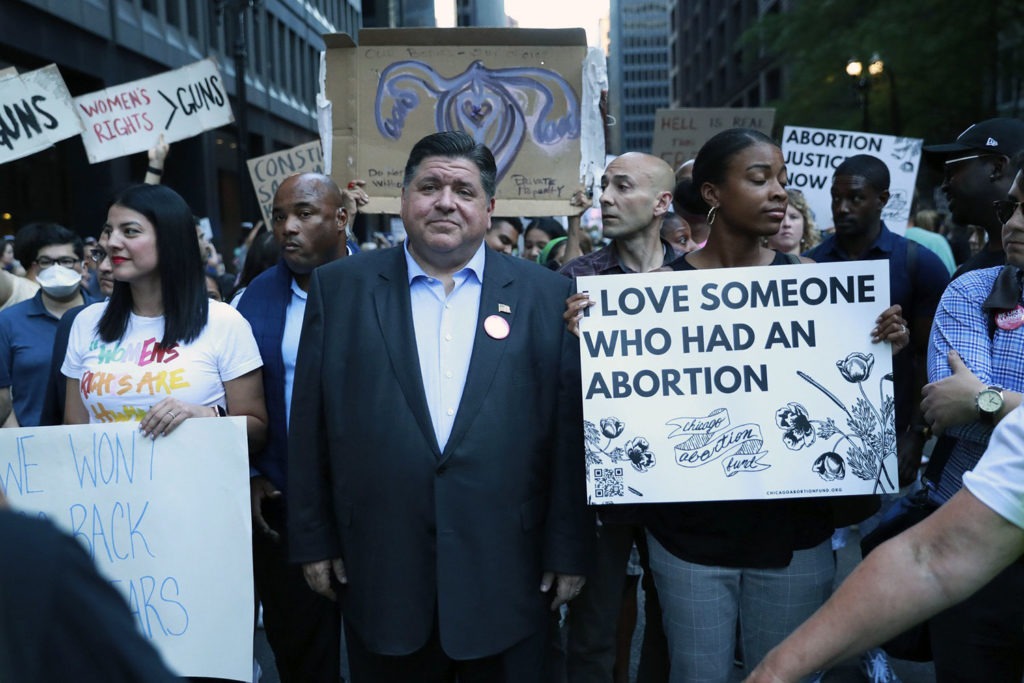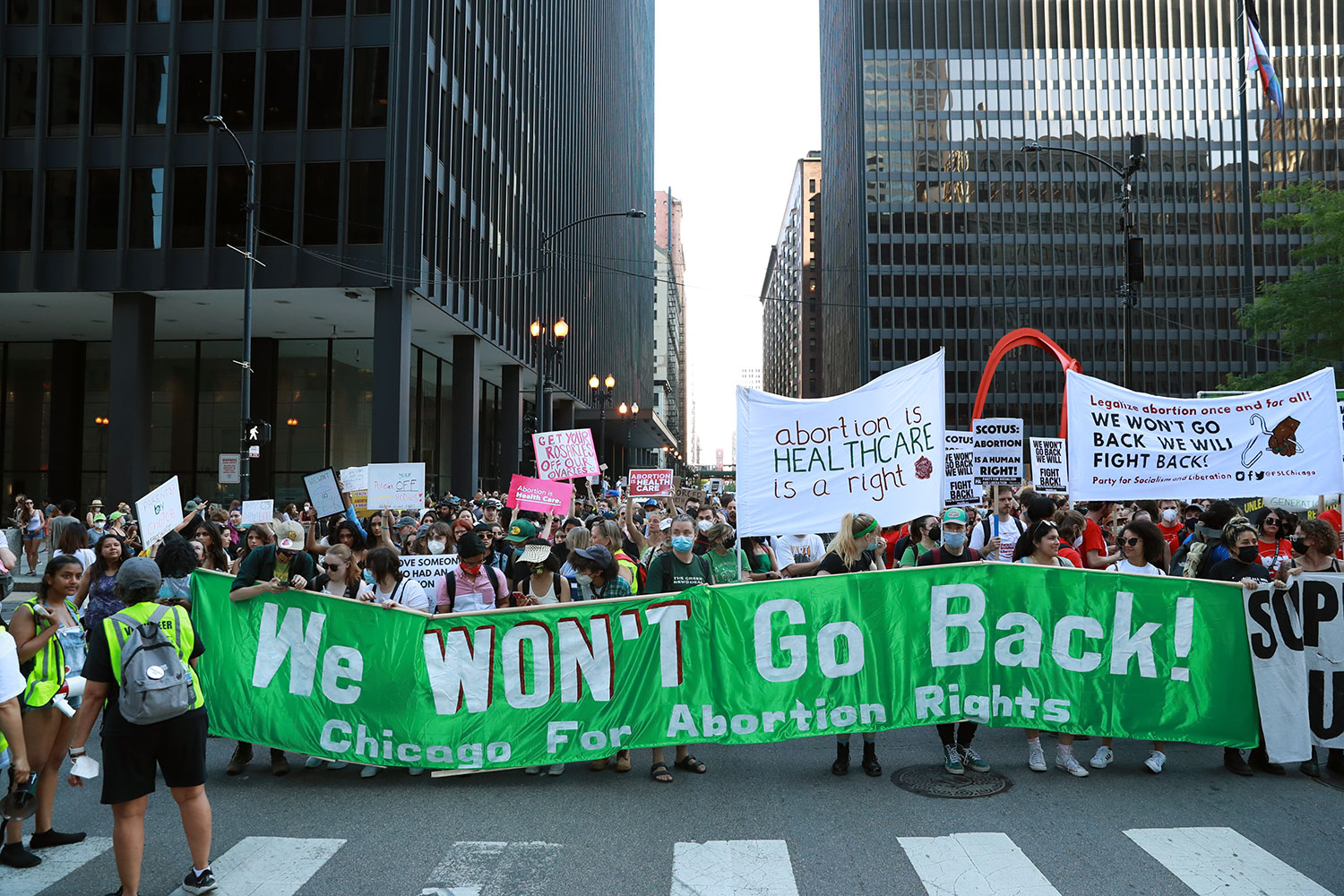After Roe v. Wade was overturned in June, a woman marched in Federal Plaza with a sign declaring, “I will not go quietly back to the 1950s.”
She was only a century off.
Now that the Supreme Court has returned the issue of abortion to the states, we’ve gone back to the 1850s, when a divisive institution that was legal in some parts of the country and illegal in others threatened to tear the Union apart. The conservative justices aren’t trying to resurrect Ward Cleaver; they’re trying to resurrect the states’ rights fulminations of Jefferson Davis.
In 1858, Illinois became the proxy for the national debate on slavery, when Abraham Lincoln challenged Stephen Douglas for his Senate seat. Lincoln wanted to prohibit slavery in the territories, hoping it would eventually die out if confined to the states where it then existed. Douglas wanted to let settlers in the territories vote on slavery, a policy he called “popular sovereignty.”
“Perhaps no local contest in this country ever excited so general or so profound an interest as that now waging in Illinois,” the New York Tribune wrote after the fourth Lincoln-Douglas debate, in Charleston.
Illinois was at the center of the slavery controversy. Now, we find ourselves at the center of the abortion controversy, for the same reason — our position in the middle of the country. In 1850, Illinois was the southernmost free state, bordering on Kentucky and Missouri. That made us a convenient destination for escaped slaves, and a popular route on the Underground Railroad. Dred Scott claimed his freedom because his master took him to Fort Armstrong in Rock Island. The Supreme Court not only disagreed, it ruled that slaveholders could not be prohibited from taking their property into the territories. Modern Illinois is surrounded by states that ban abortion, making us a destination for women seeking the procedure — the Underground Frailroad, as Margaret Atwood called the path to Canada in The Handmaid’s Tale.
(The regional divisions in the abortion and slavery controversies are strikingly similar. Most states that prohibited slavery before the Civil War now allow abortion; most of the former slave states now ban it. There is, perhaps, a historical connection between the predilection to control Black bodies and women’s bodies.)
Historian Heather Cox Richardson sees a parallel between Douglas’s popular sovereignty doctrine and the Supreme Court’s decision to return abortion to the states. A majority of Americans believe abortion should be legal in some or all circumstances, but five justices found a way to put the decision into the hands of constituencies who want to ban it.
“A strong majority in the U.S. opposed the extension of enslavement, but Douglas’s reasoning overrode that majority by carving the voting population into small groups,” Richardson wrote on her blog, Letter From an American. “When today’s jurists talk of sending decisions about civil rights back to the states, they are echoing Stephen Douglas. ‘Citizens trying to persuade one another and then voting’ is indeed precisely how democracy is supposed to work. But choosing your voters to make sure the results will be what you want is a different kettle of fish altogether.”
“The prairies are on fire,” the New York Evening Post wrote of the passion inspired by the Lincoln-Douglas debates. Much of that passion was aroused by the feeling that Southerners were attempting to make slavery legal everywhere, which was obnoxious even to moderate Northerners who didn’t favor abolition. Writing in The Atlantic, Ronald Brownstein believes the South is once again on the “offensive,” seeking to spread its way of life even to Northern states that don’t want it. Anti-abortion politicians have proposed prohibiting women from traveling to other states (such as Illinois) for the procedure, and passing a federal law than would ban abortion nationwide.
Rather than just protecting slavery within their borders, the Southern states sought to control federal policy to impose their vision across more of the nation, including, potentially, to the point of overriding the prohibitions against slavery in the free states.
It seems unlikely that the Trump-era Republicans installing the policy priorities of their preponderantly white and Christian coalition across the red states will be satisfied just setting the rules in the places now under their control…the MAGA movement’s long-term goal is to tilt the electoral rules in enough states to make winning Congress or the White House almost impossible for Democrats. Then, with support from the GOP-appointed majority on the Supreme Court, Republicans could impose red-state values and programs nationwide, even if most Americans oppose them…The Trump model, in other words, is more the South in 1850 than the South in 1950, more John Calhoun than Richard Russell.
In the 1850s, Illinois’s central location meant it was populated in the Chicago area by New Englanders who hated slavery, and in Little Egypt by Southerners who felt a kinship with their slave-owning cousins in Kentucky, Tennessee, and Virginia. Lincoln was popular in the North, Douglas in the South. That North-and-South thing is still at work in this year’s race for governor. Gov. J.B. Pritzker and his Chicago-area allies passed the Reproductive Health Act, which establishes abortion as “a fundamental right.” Pritzker’s opponent, state Sen. Darren Bailey, voted against the act. Bailey is from Southeastern Illinois and is — culturally and politically — a Southerner, from his Down Home accent, to raffling off guns to raise campaign dough, to praying in public in front of a 200-foot-tall cross, to opposing abortion (except to save the life of the mother).

As a political matter, though, Bailey knows he can’t overturn the Reproductive Health Act. Too many Yankees in Springfield.
“Abortion was codified into law in 2019, and with the makeup of the General Assembly, things are going to remain as they are,” he told NBC5’s Mike Flannery. “Banning abortion is not the answer.”
Instead, Bailey wants to “work with pro-life groups to reduce abortion,” eliminate public funding for abortions, and restore parental notification. Bailey says Pritzker wants to turn Illinois into “the abortion mecca of the nation.” Pritzker says “we are not going back on a woman’s right to choose,” and calls Illinois “an island of freedom among a sea of right-wing extremism.” In the first election of the post-Roe era, there may be no governor’s race whose candidates hold such differing views on abortion.
Pritzker also sees the pre-Civil War parallels. The governor once canceled Confederate Railroad’s appearance at the DuQuoin State Fair. He has no interest in appeasing Southern sympathizers who live in a remote corner of the state, hundreds of miles from his Gold Coast mansion.
“For those who need reminding,” he said on Primary Night, “Illinois fought with the Union.”
Related Content



